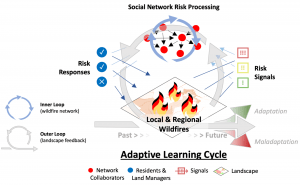FireNet is an interdisciplinary team of scientists examining the social and biophysical mechanisms that shape the capacity of people in fire-prone landscapes to cope with and adapt to intensifying disturbance regimes. We posit that adaptation requires innovation through an adaptive learning cycle in which wildfire management social networks influence peoples’ on-the-ground actions by processing signals of risk from the landscape to align actions to expectations of future risk in time and space (Figure 1).

Figure 1. Conceptual framing of social networks as part of an adaptive learning cycle triggered by natural hazards such as wildfire. Wildfires send signals about risks that are processed and interpreted through social networks to influence societal responses intended to reduce future risk.
The outer loop of the adaptive learning cycle is stimulated by periodic signals of risk from the landscape such as smoke, fires or new development. The inner loop of the social network processes local and regional signals as well as other information on an ongoing basis to develop plans and recommendations for action that may be implemented by residents and land managers. The results of the integrated cycles may take the socio-ecological system along adaptive or maladaptive future trajectories.
This work is supported by the National Science Foundation’s Dynamics of Coupled Natural and Human Systems (CNH2) Program under Grant #1922866: Developing adaptive capacity in wildfire-prone regions.